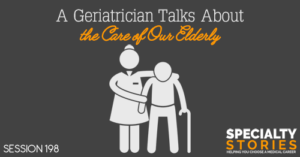Apple Podcasts | Google Podcasts
Session 198
Dr. Stacey Ruff is a Family Medicine trained Academic Geriatrician. Take a listen to the great variety of care she is able to offer her patient population. If you want more information about Geriatrics and becoming a geriatrician, check out the American Geriatrics Society.
For more podcast resources to help you with your medical school journey and beyond, check out Meded Media.
Listen to this podcast episode with the player above, or keep reading for the highlights and takeaway points.
[01:30] Interest in Geriatrics
As a medical student, Stacey was strongly interested in becoming an OB/GYN and she describes becoming a geriatrician as a circuitous route.
Her scientific interest was in maternal fetal medicine and obstetrics and gynecology. But as she started her clinical years in medical school, she soon discovered she wasn’t a highly surgical, highly procedural person. So she decided to go down the medicine route but still be able to take care of women and babies.
She ended up in a family medicine residency, and with very few OB patients and a lot of geriatric patients and she loved it. Then she applied and got accepted in a geriatrics fellowship position.
[04:35] The Biggest Myths or Misconceptions Around Geriatrics
Stacey says that one of the misconceptions about geriatrics is that it’s boring and it’s not any different than internal medicine. But they look at how muscle mass is different as we get older and how different medications could have central nervous system effects that may or may not occur at a younger age.
These are things you don’t always learn in a family medicine residency or an internal medicine residency program.
'We're looking at how the body ages physiologically and how the kidneys clear medications differently.”Click To TweetA lot of people compare geriatrics to pediatrics and Stacey gives it a yes and no. Yes, in terms of taking care of human beings. But no, in terms of they’re not looking at these developmental steps.
[06:06] Key Traits or Personalities That Make a Good Geriatrician
Stacey underlines the importance of patience is very important. It’s a myth that older people are all slow or are hard of hearing.
'Understand and take the time to get to know your patient and understand all parts of their life.'Click To TweetYou also have to have an empathetic personality. So many times they’re dealing with a home issue, or they’re having trouble with transportation, or mobility or pain or something else, or maybe they can’t drive anymore. And so, think about their situation on the whole. And it takes a holistic approach and a holistic mind as well.
[07:29] Typical Day
Stacey explains how there are a few ways you can specialize within geriatrics. Even within her own academic geriatric group, they have hospice medical directors and nursing home medical directors. They have an ACE unit director. An ACE unit is an inpatient acute care for the elderly unit. It’s a specialized unit within the hospital geared towards ambulatory, older people. They also have clinicians.
'There's a broad spectrum of specialties you can go into even within geriatrics.'Click To TweetPersonally, Stacey spends most of her time with the clinic and the fellowship program. They do geriatric assessments in the clinic setting, where they act as consultants in those cases.
Primary care doctors refer their patients to them for any wide range of reasons. But the most common is dementia or memory loss. They see patients for a couple of visits, maybe make some recommendations and do some diagnostics. And then send a report back with the patient as well as to their primary care doctor.
Stacey has her own primary care patients as well. But they all are on Medicare over the age of 65. And working with the fellowship program in an academic institution, they have multiple residency programs and fellowship programs.
But she has colleagues who work in nursing homes, or in the hospice, or in the inpatient hospital system. Hence, Stacey believes it’s a great area to specialize in. Because even if you decide you don’t like a certain area, you could always move and do a different area within the same hospital system.
[10:06] Percentage of Procedures
Stacey says she has colleagues that do joint injections, and some other basic office procedures that a typical family physician may perform. This can provide a lot of benefit to our older patients that have shoulder pain or hip pain or knee pain. If you can do a joint injection in your office and help them with that, they are so grateful and happy that you can help them right then and there instead of potentially referring them to another doc.
Stacey clarifies she’s not doing anything related to skin cancers, or most procedures. But as far as inpatient or nursing home procedures, it may have to do more with wound care. It isn’t technically using your hands, but they do cognitive testing, an additional service they provide to clients.
[11:57] Taking Calls
Call is widely variable across the country, depending on the hospital system and the type of practice you would be in. For their group practice, they share calls on the weekend. They have enough clinicians and she’s on call for one weekend, every other month. So that’s about every seven or eight weeks, where she will take one weekend call from 5pm on Friday to 8am on Monday morning.
They cover nursing home calls, but they don’t go into the nursing homes on the weekends. They go into the hospital and round on their patients. They take calls that may or may not come in from our clinic, which are pretty rare, but it still occurs.
Stacey adds that geriatrics programs or groups affiliated with a Veterans Administration hospital may be different and it may vary. Depending on the size, if there are a lot of clinicians, they may have somebody covering nursing homes for the weekend, somebody covering the hospital, somebody covering the clinic, etc.
[14:40] The Hospitalist Framework
Stacey says they have two geriatric hospitalists within their academic group. One of them tends to be more of the teaching part of the monthly rotations. They’re teaching students and residents as well as fellows. They alternate months at the hospital and they’re seeing primary care patients and doing geriatric consult.
Having more geriatric hospitalists, Stacey thinks this is an advantage. Although she’s not a geriatric hospitalist, she does cover that service when on call. And she thinks it’s a great program with the way they have it set up.
[16:24] The Training Path
Any general practitioner, internist, family physician, and even other specialties could take the certificate of added qualification for geriatrics, hospice or palliative medicine. But this has changed several years ago, as you’re now required to do a fellowship in order to sit for the geriatrics boards or the certificate of added qualification.
[08:15] Hurdles She Had to Overcome as an Osteopath
As an osteopathic physician herself, Stacey is not seeing any bias against DOs. Although she understands that this may not be the case in other areas. But she feels lucky that she’s not seeing any bias whatsoever.
That being said, the only hurdle she ran into was when she did an osteopathic Family Medicine Residency with OMM. She took the DO boards for med school for residency. And she thought she should have researched and thought about this. But she ended up accepting an allopathic internal medicine fellowship program in geriatrics. And so, she did have issues initially when she went to apply to take her certificate of added qualification.
But this wouldn’t be as big of an issue now since most of these programs have become combined duly accredited. And so, it shouldn’t be an issue as time goes on for medical students and residents thinking about geriatrics.
[20:50] Message to Non-Geriatric Primary Care Physicians
For physicians who want to be able to treat their own patients, Stacey hopes they have an understanding that a 90-year-old is not necessarily going to have the same metabolism of medications as a 40 or 50-year-old.
'It's not that difficult to do a geriatric assessment if you're a non geriatrician.'Click To TweetStacey adds that even if you’re not a geriatrician, you could still do a geriatric assessment. And it’s something you can do in your own office if you take that time. At least start some of the workup if you’re concerned about memory impairment or dementia. Because unless you’re a pediatrician, you’re really going to be seeing geriatric patients in everything that you do.
[23:13] Specialties They Work the Closest With
Specialties they work closely with are neurologists, neurosurgeons, and physical medicine & rehab, and urology. They also often refer to physical therapy since they have a lot of patients who need assistive devices like canes and walkers. A lot of times, urologists are very integral in helping their patients with issues like incontinence.
[24:31] The Most and Least Liked Things
Stacey loves being a geriatrician. She says it’s wonderful to see someone who is 99 years old, who’s functionally doing so well and cognitively doing so well. And this is one of the things she loves about geriatrics.
What she likes the least aside from the documentation of electronic health records is having a medication they want to prescribe for a patient not be covered by insurance, which is frustrating.
Also, they often run into a lot of challenging social situations with their patients including family dynamics and living situations, which can be difficult. The biggest one out of those is probably driving cessation. They have to tell people quite often bad news. That they have Alzheimer’s or dementia so they shouldn’t be driving. She doesn’t want to be telling people those things, but it’s their job to keep them safe too.
[28:19] Major Changes Coming to the Field of Geriatrics
The past year, they’ve been able to do telemedicine where they’re doing video and telephone visits for geriatric patients. This has helped them tremendously. Stacey explains this never replaces a good physical exam. But to be able to observe someone in their home environment can answer some questions. And for something simple like that to be able to use telemedicine has been so valuable for geriatric.
That being said, she thinks that’s where things will move, not necessarily doing telehealth, but more home health.
They have some geriatricians in their institution that have always been interested in having a physician home service. And that definitely runs into roadblocks because of lack of interest on the physician’s part due to the lack of reimbursement. But if they can change this, this would greatly help them with patient care.
[29:50] Final Words of Wisdom
If she had to do it all over again, Stacey would still be a geriatrician and she’s happy with the path she had taken.
Finally, she wishes to tell students that if you have any interest, at least, do an elective rotation if you end up going into primary care. See how you like it, and if you like it, apply for a fellowship.
The nice thing about geriatrics right now, too, is that it’s not a particularly competitive specialty compared to some of the other subspecialties in medicine. So it’s a nice way that you can gain that additional training to stand out from your peers who may be internal medicine or family physicians. It’s a year-long fellowship and the majority of people who pursue it truly enjoy it.
Links:
SEARCH SITE
LISTEN FOR FREE












